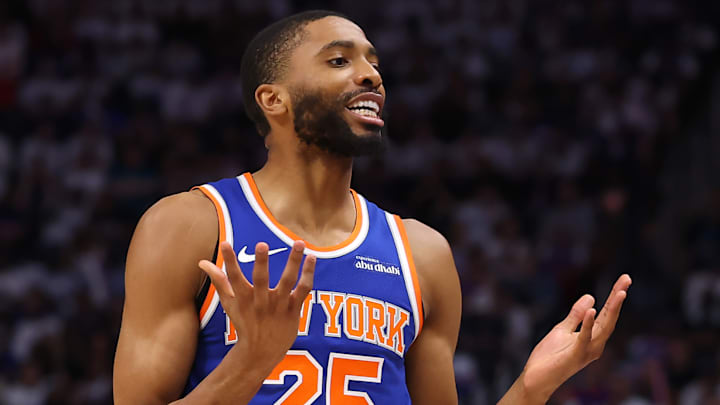Signing Mikal Bridges to a four-year, $150 million extension clarified a lot about the New York Knicks’ future. Not everyone is a fan, though.
The Athletic’s John Hollinger just nominated the Bridges extension as one of the worst or most questionable moves of the offseason. Among his biggest qualms, he believes this was a “premature reaction to the Bird rights trap,” and that New York felt pressured by the “sunk cost of trading five first-round picks” to land the 29-year-old wing.
Hollinger’s concern holds merit. Bridges is coming off a largely unspectacular season, and the Knicks most definitely overpaid in the trade to get him. But this critique of the extension itself misses the mark in a big way.
The Knicks did not overpay Mikal Bridges
It would be a stretch to say the Bridges extension is without risk. The bigger risk, however, would have been waiting until next summer.
At that point, as a free agent, Bridges’ four-year max would have gone from $156.2 million (his extension max) to $223.7 million. Enough teams are projected to have cap space that you can envision one of them throwing their own max (four years, $214.7 million) his way.
If not the full boat, Bridges could have commanded something close to it. He may not be a caps-lock STAR, but he’s still among the most valuable secondary players. Teams trip over themselves to acquire those with his three-and-D skill set. And whatever you think of his debut season in New York, he does more than just that.
Remember, it only takes one other suitor. Barring absolute disaster, Bridges would almost certainly have more. By waiting for free agency, the Knicks may have needed to dangle a fifth year—and more guaranteed money—to lock him down.
Bridges’ extension isn’t that big of a risk
As Hollinger notes, Bridges would be eligible to sign the same extension he just did prior to hitting the open market. New York could have played out this season, and then hashed out an agreement in June.
Still, waiting this out also paves the way for Bridges to improve under head coach Mike Brown. And any on-court bump probably compels him to take his chance in free agency—or leverage the Knicks into giving him more money.
This extension is a more-than-reasonable middle ground. Bridges remains trade-eligible before February’s deadline, and the Knicks nailed down a key part of their core in exchange for an average annual salary that, as of now, may not even rank among the league’s top 50. If this isn’t a win, it’s at least far from a mistake.
